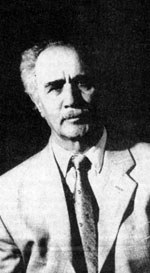|
|

|
 |
|
|
Kemal
Burkay:
Politician and Poet
-
-

- Kemal
Burkay was born in 1937 in the village of Dirban (Kizilkale) in
the region of Dersim (known today as Tunceli) in Turkish Kurdistan.
His birth occurred during the Kurdish rebellion in Dersim, which
was violently repressed by the Turkish state.
-
- After receiving his secondary-school
diploma he attended the Akcadag Kîy Institute (a teachers'
college) and became a teacher in 1955. In 1956 he began studying
law at the Faculty of Law in Ankara. While working as a teacher
and bookkeeper, he completed his law degree in 1960 through correspondence
courses. He worked for a time as an assistant in the administrative
offices of the regional council and then became a lawyer. Until
1971 he practiced in Elazig and Tunceli, from 1974 on in Ankara.
-
- While studying at the university,
Burkay had adopted the outlook of the socialist world. In 1965
he became a member of the Workers' Party of Turkey (TIP) and was
an active party organizer in Elazig, Bingîl, Tunceli, and
Erzincan. In 1966 he was imprisoned for four months because of
an article he had written on the Kurdish question.
-
- In 1968 he was elected to the Executive
Committee of TIP and subsequently was a member of the administrative
staff at the party's headquarters. In 1969, during clashes that
broke out during a performance of the play "Pir Sultan" in Tunceli,
he was once again arrested and severely tortured.
-
- After the military coup of 12 March
1971 he was arrested because of his political activities on orders
of special courts in Diyarbakir and Ankara. After a year of imprisonment
he was released. Because of a new arrest warrant, he fled the
country in 1972 and lived for two years in the Federal Republic
of Germany.
-
- During this period he worked with
great commitment in the area of political education and organization
of Kurdish workers and students abroad. He also wrote about the
Kurdish question and the economic and social structure of Kurdistan,
e.g. his analysis "Türkiye Sartlarinda Kürt Halkinin
Kurtulus Mücadelesi" ("The Kurdish People's Liberation Struggle
Under the Conditions Prevailing in Turkey") was pseudonymously
published in 1973.
-
- After the end of the military government
and the declaration of a general amnesty he returned to his homeland
in 1974, and in the same year founded, together with a group of
friends, the Socialist Party of Turkish Kurdistan (TKSP, known
today as the PSK or Socialist Party of Kurdistan). Since then
he has been the Secretary General of the party.
-
- When a wave of arrests of members
of the TKSP began in 1980, he once again fled the country. After
the military coup later that year, the government mounted a search
for him and withdrew his citizenship. For these reasons, he received
political asylum in Sweden and has lived there since then.
-
- Since his youth, Burkay has been
interested in literature. He has written poems, short stories,
and novels. His first novel, YashamanÌn ôtesinde
(On the Other Side of Life) was published as a serial by the newspaper
"Vatan" in 1964, and beginning in 1964 his poems have published
in numerous literary journals.
-
- Together with a group of intellectuals
he founded a literary journal in Elazig in 1965. In the following
year he published his first volume of poems, Prangalar (Chains
of Slavery). In 1975 his second volume of poetry, Dersim, was
published.
-
- Numerous works written or translated
by Burkay have been published in Kurdish and Turkish, including
Milli Mesele ve Krdistan'da Feodalite-asiret (The National Question,
Feudalism, and Tribes in Kurdistan), KÅrdistan'in SîmÅrgelesmesi
(The Colonization of Kurdistan), and Kürt ulusal Hareketleri
(Kurdish Nationalist Movements).
-
- In addition to his political work
abroad, he continued his research and literary activities. In
1992 he published the first volume of his work of historical research,
KÅrtler ve Kurdistan (The Kurds and Kurdistan). His published
literary works include the children's book Aliko u Baz (Aliko
and the Buzzard, 1986); a book of Kurdish verse, Carin (1992);
and Yakilan Shiirin Türküsü (The Song of the Burned
Poem, 1993). In 1993 a selection of his poems translated into
German was published under the title Helin.
-
- Kemal Burkay is very popular in
Turkey and Kurdistan not only as a politician but also as a writer.
Several of his poems have been set to music in Turkey. For example,
"Gülümse" ("Smile!") was sung by the well-known Turkish
singer Sezen Aksu, and a line from it - "Bir kedim bile yok" ("I
don't even have a cat") - has practically become a household word.
His poem "Mamak Türküsü" ("Song of Mamak") has
recently enjoyed great popularity.
|
 |
|
